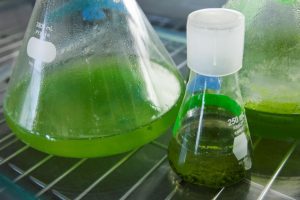A European research and development (R&D) consortium is seeking to develop an algal biorefinery. The three-year project, estimated to cost 1.4 million euros, of which 65 percent is being provided by ERDF funds, is a partnership of six organizations in the Basque Autonomous Community including Navarre and France -NEIKER-Tecnalia, National Centre of Renewable Energies (CENER), Tecnalia Research & Innovation, Association of Industry of Navarre (AIN), Association for the Environment and Safety in Aquitaine (APESA) and the Centre for the Application and Transformation of Agro-resources (CATAR-CRITT). The goal of the CYCLALG project is to bring algae-based biorefineries to fruition through the development and validation of technologies used to produce biodiesel from algae.

The European CYCLALG project brings together six R&D centres to develop an algae-based biorefinery. Photo Credit: CYCLALG
Using the circular economy as a guide, the project will use waste generated from the processes to provide nutritional components in the process to cultivate microalgae. CYCLALG is also based on a biorefinery model that seeks to make comprehensive use of microalgal biomass, extend the useful service life of the waste generated in the process and diversify it into new products of interest in the chemical, energy and agricultural industries, thus giving the microalgae biomass added value and improving the economic framework of the process.
Apart from coordinating the project, NEIKER will be responsible for establishing the optimum, cost-effective, sustainable conditions of the heterotrophic crops that will be producing the algal biomass destined to obtain biodiesel.
Building on previous CYCLALG work proving the feasibility of developing diesel substitutes using algae, the project will provide new approaches to problems such as the fall in productivity of oil in the pre-industrial scale phase. The groups plan to introduce the heterotrophic cultivation of species of oleaginous microalgae as an alternative means for improving the productive efficiency of the process.
In terms of productivity, the heterotrophic cultivation of microalgae as proposed in CYCLALG offers clear advantages over conventional phototrophic crops for obtaining biodiesel, says the consortium, even though they require organic sources of carbon and nitrogen that are much more expensive than traditional inorganic fertilizers. Thus, this “waste” will become a “food” for the process through hydrolysis, fractionation and solubilisation into nutritional concentrates. In addition, the CYCLALG project will research the development of other technologies that allow additional co-products to be created from waste such as the synthesis of biopolymers and other biomolecules, the obtaining of bio-fertilizers, animal foods and the production of biomethane.

